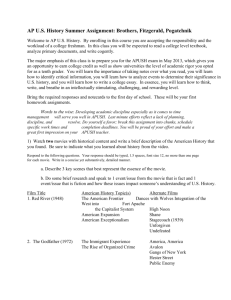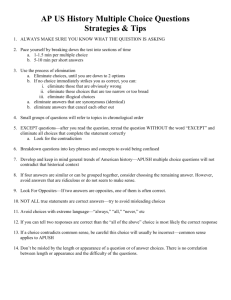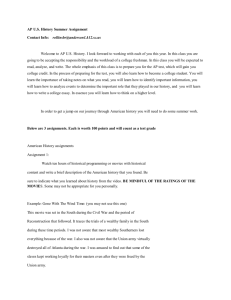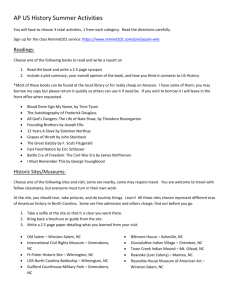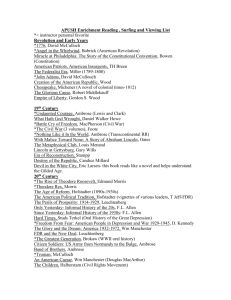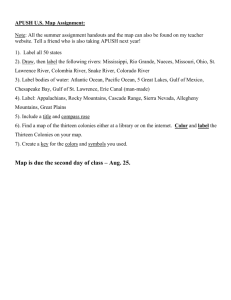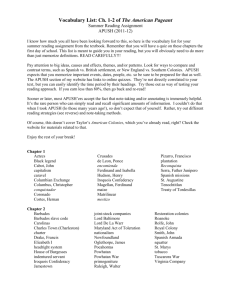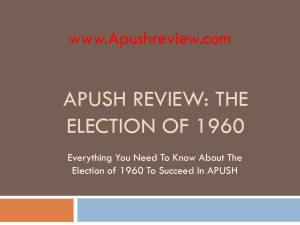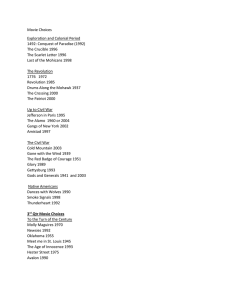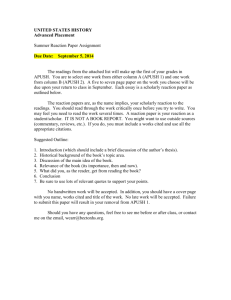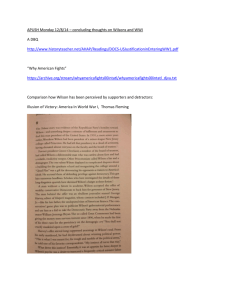AP U.S. History Summer Assignment: Brothers, Fitzgerald
advertisement
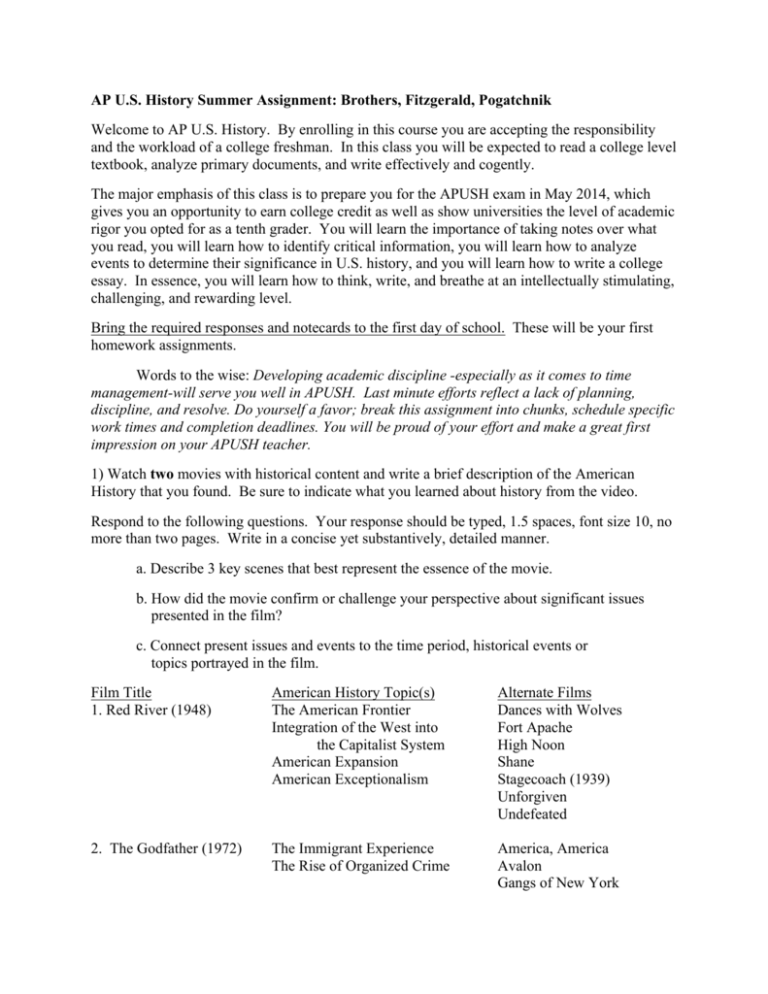
AP U.S. History Summer Assignment: Brothers, Fitzgerald, Pogatchnik Welcome to AP U.S. History. By enrolling in this course you are accepting the responsibility and the workload of a college freshman. In this class you will be expected to read a college level textbook, analyze primary documents, and write effectively and cogently. The major emphasis of this class is to prepare you for the APUSH exam in May 2014, which gives you an opportunity to earn college credit as well as show universities the level of academic rigor you opted for as a tenth grader. You will learn the importance of taking notes over what you read, you will learn how to identify critical information, you will learn how to analyze events to determine their significance in U.S. history, and you will learn how to write a college essay. In essence, you will learn how to think, write, and breathe at an intellectually stimulating, challenging, and rewarding level. Bring the required responses and notecards to the first day of school. These will be your first homework assignments. Words to the wise: Developing academic discipline -especially as it comes to time management-will serve you well in APUSH. Last minute efforts reflect a lack of planning, discipline, and resolve. Do yourself a favor; break this assignment into chunks, schedule specific work times and completion deadlines. You will be proud of your effort and make a great first impression on your APUSH teacher. 1) Watch two movies with historical content and write a brief description of the American History that you found. Be sure to indicate what you learned about history from the video. Respond to the following questions. Your response should be typed, 1.5 spaces, font size 10, no more than two pages. Write in a concise yet substantively, detailed manner. a. Describe 3 key scenes that best represent the essence of the movie. b. How did the movie confirm or challenge your perspective about significant issues presented in the film? c. Connect present issues and events to the time period, historical events or topics portrayed in the film. Film Title 1. Red River (1948) American History Topic(s) The American Frontier Integration of the West into the Capitalist System American Expansion American Exceptionalism Alternate Films Dances with Wolves Fort Apache High Noon Shane Stagecoach (1939) Unforgiven Undefeated 2. The Godfather (1972) The Immigrant Experience The Rise of Organized Crime America, America Avalon Gangs of New York Hester Street Public Enemy 3, Modern Times (1936) The Great Depression Dehumanization of Labor All the King’s Men (1949) City Lights The Grapes of Wrath 4. Casablanca (1942) American Neutrality Vichy France World War II From Here to Eternity The House of 92nd Street Passage to Marseilles Watch on the Rhine 5. Tora, Tora, Tora (1970) World War II Battleground D-Day Fat Man & Little Boy Hiroshima: Out of the Ashes Patton Saving Private Ryan Schindler’s List To Hell and Back 6. Good Night and Good Luck (2005) The McCarthy Era Truman Blacklisting The Front Hollywood and the Cold War Guilty by Suspicion 7. Dr. Strangelove (1964) The Nuclear Age The Cold War 8. Thirteen Days (2000) Cuban Missile Crisis The Missiles of October Cold War October Sky The Kennedy Administration 9. Apocalypse Now (1979) Vietnam War Advise and Consent Fail Safe The Manchurian Candidate Seven Days in May Born on the Fourth of July The Deer Hunter Fog of War Full Metal Jacket Green Berets Heart of Darkness Path to War Platoon 10. Malcolm X (1992) Civil Rights Historical Biography 11. All the President’s Men (1976) Watergate Scandal The Nixon Administration Investigative Journalism Nixon 12. Norma Rae (1979) Late 20th Century Union Movement Erin Brockovich Silkwood 13. Recent political issues The Ghosts of Mississippi The Help Mississippi Burning The Rosa Parks Story Flight ‘93 North Country Pat Tillman Story ‘W” Who Killed the Electric Car? 2) Read one of the following books. a. 1776 by David McCullough b. Founding Brothers by Joseph Ellis c. April 1865 by Jay Winik d. Devil in the White City by Erik Larson e. She was one of us: Eleanor Roosevelt and the American Worker by Brigid O’Farrell f. Eyes on the Prize by Juan Williams g. I May Not Get There With You: the true Martin Luther King by Michael Eric Dyson h. 102 Minutes by Jim Dwyer APUSH Book Review Requirements No more than 2 pages typed. Write in a concise yet substantively detailed manner. a. Examine the author’s perspective. 1. What does the author want the readers to think, feel, or respond to? b. Your recommendation of the book. 1. What worked in the book? 2. Key characters, issues or events that you found admirable or unforgettable. What makes them admirable or unforgettable? c. How did the book challenge or confirm your perspective on the historical events or themes presented in the book? 3) Complete a note card for each of the terms listed below. This must be done in your own handwriting. No cut and paste computer junk allowed. Be sure to have the term and the explanation on the same side of the card. Your definition should give the important information: Who was the person, group, or thing? What did they do? When did they do it? Why was the term significant short term and or long term? (BTW-writing that the term continues to influence or impact America is not a thoughtful response. Be bigger thinkers!) English Navigation Acts Great Migration Half-way Covenant Headright System Indentured Servants Joint-stock company Mercantilism Middle Passage Puritan Triangular Trade Committees of Correspondence Loyalists Antifederalists Checks and Balances Separation of Powers Tariffs Marbury v. Madison McCulloch v. Maryland Corrupt Bargain Era of Good Feelings Kitchen Cabinet Missouri Compromise Monroe Doctrine Nullification Pet Banks Spoils Systems War Hawks Whig Party Abolition Freeport Doctrine Kansas-Nebraska Act Popular Sovereignty Bleeding Kansas “Free Soil” “Fifty-four forty or fight” Border States Carpetbaggers Compromise of 1877 Copperheads Ironclads Sharecropping “Ten-Percent Plan” Dawes Act Gilded Age Jim Crow Laws Trusts Dollar Diplomacy Isolationism Muckrakers New Freedom Poll Tax The Big Four Yellow Journalism 100 days Bonus Army Deficit Spending Hoover-villes Lost Generation Roaring Twenties Blitzkrieg Final Solution Internment Kamikaze Rosie the Riveter Second Front Brinksmanship Containment Vietnam-ization New Deal Feminine Mystique Presidential Impeachment Détente Dixie-crats Great Society Silent Majority Gulf War Truman Doctrine Fair Deal Warren Court Attica Manhattan Project Reading and Viewing Caution: The titles on this list include images and or content that could be considered for mature audiences only. Check with your parents if you’re concerned as to whether the movie or book fits within their mature content parameters. sbrothers@edenpr.org sfitzgerald@edenpr.org jpogatchnik@edenpr.org
